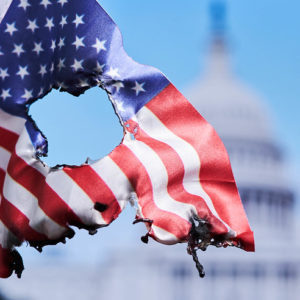Since its first primetime hearing in June, the bipartisan January 6th Select Committee has done the nation an unparalleled service.
Over a series of extraordinary hearings in June and July, the committee’s Republicans and Democrats revealed damning information about the planning and execution of the January 6 insurrection. While the committee’s work is not complete — with more hearings expected this fall — the information it has uncovered calls for accountability under the Constitution.
Given that 2020 election deniers are on the ballot this year across the country, voters have a historic chance to play a central part in that accountability.
First, let’s review what we know. Former President Donald Trump fanned the flames of January 6th’s violence. Trump told his supporters to be in Washington that day, saying it would be “wild.” Trump knew that many in the crowd for his January 6 speech on the Ellipse were armed and included members of violent extremist groups. Trump sent those armed supporters to the Capitol. He tried to join them as they fought to stop the counting of Electoral College votes, overturn the choice of the American voters in the 2020 presidential election and keep Trump in power.
After he was prevented from going to the Capitol, the former president sat in the White House dining room, watching the horror unfold on live television, doing nothing to stop it for 187 minutes. We know police officers died, while the lives of Vice President Mike Pence, House Speaker Nancy Pelosi and other members of Congress were threatened. Pence, in fact, was mere feet away from the violent mob that had threatened to hang him as Trump posted tweets that riled the crowd to attack.
We also know Trump was aided and abetted by a phalanx of attorneys and politicians on Capitol Hill and in states across the country who pushed, and are still pushing, dangerous schemes to sacrifice constitutional democracy to put one man back in power. With these cronies, Trump tried and failed to enlist the Department of Justice in overturning the 2020 election. He tried and failed to twist the arms of state and local officials to overturn the election. And he tried and failed to get Pence to overturn the election.
When all those attempts to hold onto power failed, Trump and an extremist faction turned to the violence we saw on January 6.
Liz Cheney, the committee’s Republican vice chair, put it succinctly: “There has never been a greater betrayal by a president of the United States of his office and his oath to the Constitution.”
With this in mind — and while expecting even more revelations from the committee in the coming weeks — “We the People” must turn our eyes to America’s governing charter. Specifically, we must embrace the power of the 14th Amendment, drafted and ratified in the wake of the Civil War. Its framers included a section that prohibits anyone who has taken an oath to support the Constitution and “engaged in insurrection or rebellion against the (United States), or given aid or comfort to the enemies thereof” from holding “any office, civil or military, under the United States, or under any State.”
That means the Constitution prohibits insurrectionist officeholders from keeping their offices and holding future office. In some states, voters have used this 14th Amendment language to challenge the ability of candidates to appear on ballots. And in states like New Mexico, these voters have succeeded. Of course, while this constitutional provision focuses on officeholders who have violated their oaths, and many of these legal challenges are still in the courts, there are also other avenues for constitutional accountability.
Across America, we can take action ourselves at the ballot box. We can proudly fulfill the democratic vision of a post-Civil War generation who — after fighting a battle to unite the nation in greater freedom and inclusive democracy — believed keeping insurrectionist officers out of government was so important they banned it in the Constitution.
Ultimately, the Constitution is ours. In this perilous time for our democracy, we can stake our claim to it with our votes.

